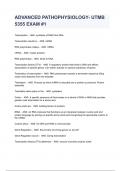Exam (elaborations)
ADVANCED PATHOPHYSIOLOGY- UTMB 5355 EXAM #1 Questions And Answers ( Verified )
- Course
- Institution
ADVANCED PATHOPHYSIOLOGY- UTMB 5355 EXAM #1 Questions And Answers ( Verified ) Transcription - ANS synthesis of RNA from DNA Transcription results in - ANS mRNA RNA polymerase makes - ANS mRNA mRNA - ANS makes proteins RNA polymerase - ANS binds to DNA Transcription fact...
[Show more]



